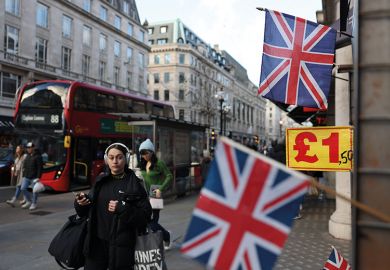Indexing tuition fees to inflation could be “as good as it gets” for English universities, with their future dependent on difficult-to-control factors including the country’s wider economic growth, according to a leading vice-chancellor.
The recent fee rise to £9,535 was “not what we asked for but is what we got”, King’s College London’s Shitij Kapur told a Westminster Higher Education Forum policy conference on UK university financial sustainability.
“And my sense is that might be as good as this stream – the fee stream – can get. I don’t actually see that there is either the public appetite or support or the political will to change that £9,535 number and to me the best reasonable outcome is that gets linked to inflation going forward because, let’s keep in mind, that is not, as yet, in the bag.”
Even securing a commitment to continue to raise fees beyond the one-year settlement “will not be enough”, Professor Kapur said, adding that he foresaw three potential scenarios for the future of the sector – all dependent on factors beyond the control of institutions and the government.
The first, according to Professor Kapur, was a “golden” option, involving strong economic growth of 2 or 3 per cent – which could translate into more direct public funding – and increased demand in the international student market.
This would allow the entire university sector and individual universities to “thrive together” and preserve a system that is broadly similar to the current one, albeit with some efficiency savings and new services still necessary, Professor Kapur said.
Two other options were less palatable for universities, however. One could see the economy struggle and hoped-for economic growth not materialise, but international students continue coming to the UK. This, according to Professor Kapur, would result in the “remodelling” of some universities but not an entire system restructure.
The latter would be the outcome of a third scenario, he said, in which both the economy and international student numbers tank.
Professor Kapur, who has repeatedly spoken out on the state of university finances in recent months, said it was not yet clear which scenario would play out.
But he warned that, particularly in the international student space, the world was changing, pointing to a recent meeting he had with the Indonesian president, Prabowo Subianto, who had told him he was working with the governments of Turkey, China, Serbia and India to organise study places with government stipends.
The fact that the sector had “settled” for an inflationary rise – rather than push for a higher figure – meant it had essentially accepted £6,000 fees in 2012 prices, Professor Kapur highlighted.
He said if fully implemented, the recent fee rise was worth £3.5 million for King’s, while the cost of raising employer national insurance contributions announced in the budget by chancellor Rachel Reeves will cost the institution £13-14 million.
The system may provide enough funding to teach undergraduates, he said, but not to support the current British system of research-led education, delivered with low staff-student ratios.
Without a recovery in growth and international students, the government “will have to jump in and restructure the system with some top-down intervention”.
“In many countries, the central ministries decide which universities do what,” he said. “Do I like that system? No. But could we find ourselves in that system? I think in the third scenario we can.”
Register to continue
Why register?
- Registration is free and only takes a moment
- Once registered, you can read 3 articles a month
- Sign up for our newsletter
Subscribe
Or subscribe for unlimited access to:
- Unlimited access to news, views, insights & reviews
- Digital editions
- Digital access to THE’s university and college rankings analysis
Already registered or a current subscriber?








